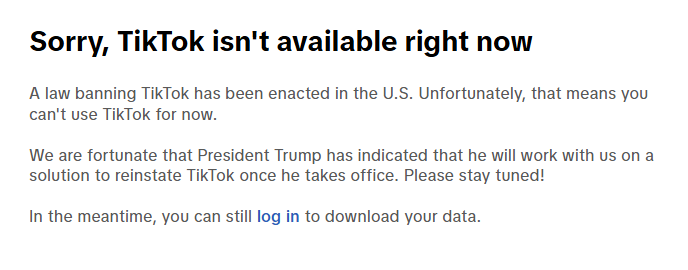Millions of Americans woke up today to find TikTok, the immensely popular video-sharing app, inaccessible across the United States. This development follows months of legal battles and heated political debates, culminating in a government-mandated ban on the platform due to national security concerns over its Chinese ownership.
The ban, which went into effect just a day before Donald Trump’s second inauguration as president, underscores the escalating tech and geopolitical tensions between the US and China. The Trump administration has long argued that TikTok, owned by Beijing-based ByteDance, poses a risk to national security, alleging that user data could be accessed by the Chinese government. ByteDance has consistently denied these claims, stating that US user data is securely stored on domestic servers with backups in Singapore.
Legal and Political Battles
The Supreme Court recently upheld legislation mandating the app’s removal unless ByteDance divests its US operations. The ruling, hailed by supporters as a critical step to safeguard American data, has faced criticism from free speech advocates who argue that the decision sets a troubling precedent for government intervention in technology.
The ban’s immediate impact is significant. TikTok, which boasts over 150 million US users, has become a hub for creativity, entertainment, and income for many Americans. Influencers and small businesses that rely on the platform for revenue now face uncertain futures and are exploring alternatives such as Instagram Reels and YouTube Shorts to sustain their digital presence.
Hope for a Return?
Despite the ban, there remains a possibility for TikTok to return. President Trump has hinted at a potential 90-day extension to allow ByteDance to divest its US operations. This could pave the way for American companies like Oracle or Walmart—both previously interested buyers—to acquire a stake in the app and satisfy the US government’s demands.
A Polarized Debate
Reactions to the ban have been sharply divided. Advocates argue it is a necessary measure to protect national security and prevent foreign influence, while critics see it as an overreach that disrupts the tech industry and curtails digital freedoms.
On the other hand, civil rights groups have expressed concerns about broader implications. “This ban raises questions about free speech and government control over online spaces,” said an advocate from the Electronic Frontier Foundation.
A New Era for Tech Policy
As President Trump begins his new term, the TikTok ban reflects broader challenges in navigating data privacy, tech innovation, and national security in a globally interconnected digital economy. For now, TikTok’s absence marks a significant shift in the US social media landscape, leaving users and creators to grapple with its fallout while waiting to see if the app will ever make its way back to their screens.
The situation highlights the evolving complexities of US-China relations and sets the stage for future conflicts over technology and global influence. Whether TikTok’s US chapter will close permanently or find a resolution remains a story still unfolding.
Sign up for our Sunday Spectator. Delivered to your inbox every Sunday, with all the news from the week.









